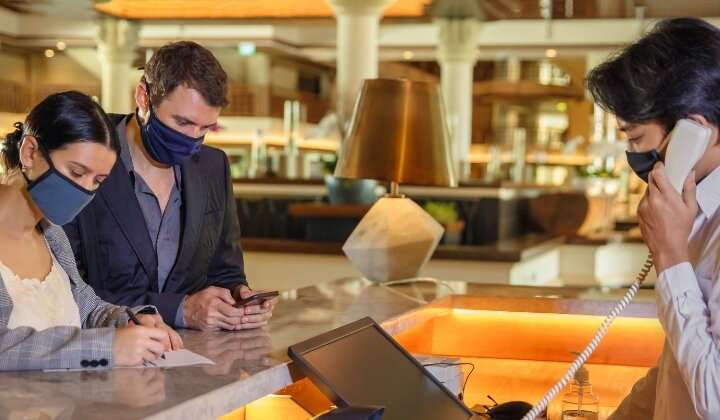#Humanizing hotel brands during COVID-19 could encourage tourists to return
“#Humanizing hotel brands during COVID-19 could encourage tourists to return”

Hotels should build an emotional attachment with tourists when communicating during crises such as the COVID-19 pandemic if they are to encourage them to return, according to new research.
The study finds that crisis communication emphasizing shared emotional responses to risks enables tourists to humanize the hotel, which can subsequently create an emotional attachment. This attachment can then increase tourists’ intentions to visit once the crisis ends, which is crucial if the industry is to recover.
Researchers from the Universities of East Anglia (UEA), Bath and the West of England say their findings challenge the approach that dominates many hotels’ current COVID-19 communication, which is to focus on cancelation policy and commitment to cleanliness.
The tourism industry has been hugely affected by COVID-19, with lockdowns and travel bans introduced at the height of the pandemic—by late April coronavirus had spread to 185 countries, affecting millions of people and shutting down thousands of businesses.
As a result, the study authors say hotel groups such as Four Seasons and Hilton all emphasized publicly their commitment to cleanliness to reduce tourist’s perceptions of the risk to health. However, they argue this approach only focuses on cognitive, or rational, aspects of risk perceptions and ignores emotional responses to risks.
They add that their findings, published in the Annals of Tourism Research, provide unique insights on the impact of crisis communication during a sustained global crisis such as the coronavirus pandemic, whereas previous research on crisis and disaster management in tourism mainly focuses on recovery after the event.
Dr. Haiming Hang, from the University of Bath’s School of Management, said: “During COVID-19, fear and anxiety are the most common emotions among both tourists and the hotel sector. Tourists experience fear and anxiety towards the health risks of COVID-19, while the hotel sector feels fear and anxiety about the uncertainty it faces.”
Dr. Lukman Aroean, of UEA’s Norwich Business School, added: “Understandably hotels wish to reassure customers about the practical precautions they are taking.
However, we argue that crisis communication focusing on shared emotions during the current coronavirus pandemic is very important, as it can establish emotional attachment with tourists better than rational statements can. This can be crucial for tourism recovery, because emotional attachment can increase tourists’ intentions to visit when the outbreak ends.
“We show that humanizing the brand underlines the impact of shared emotions on emotional attachment and demonstrates the key reason shared emotions can trigger emotional attachment.”
The study involved 405 American participants whose travel plans were disrupted by the coronavirus pandemic. The research team collected details about their travel plans (purpose and destination), and perceived severity, susceptibility and emotions (fear, anxiety, worry, unease) towards the coronavirus pandemic.
Participants were then randomly allocated to one of the three experimental conditions. In all conditions they were exposed to the same experimental stimulus—a fictitious middle-market international hotel chain—to control participants’ pre-existing knowledge of real hotels.
Participants in the control condition were not exposed to any crisis communication message. In the other two conditions, the hotel’s crisis communication focused on the same areas, commitment to cleanliness and cancelation policy, but they differed on why the hotel wanted to do this.
In the cognitive (rational) condition, consistent with many hotels’ current response, the crisis communication explained the hotel’s commitment to cleanliness was to reduce health risk.
In the shared emotions condition, the crisis communication explained the hotel’s commitment to cleanliness was because it shared the same emotions as tourists: the hotel employees and their families are susceptible to coronavirus just like everyone else. The uncertainty surrounding the pandemic also makes the hotel anxious and worried because it is hard for them to know how exactly they will be impacted or how bad things might get.
More information:
Haiming Hang et al, Building emotional attaching during COVID-19, Annals of Tourism Research (2020). DOI: 10.1016/j.annals.2020.103006
Humanizing hotel brands during COVID-19 could encourage tourists to return (2020, July 23)
retrieved 23 July 2020
from https://phys.org/news/2020-07-humanizing-hotel-brands-covid-tourists.html
This document is subject to copyright. Apart from any fair dealing for the purpose of private study or research, no
part may be reproduced without the written permission. The content is provided for information purposes only.
If you want to read more Like this articles, you can visit our Science category.
if you want to watch Movies or Tv Shows go to Dizi.BuradaBiliyorum.Com for forums sites go to Forum.BuradaBiliyorum.Com




